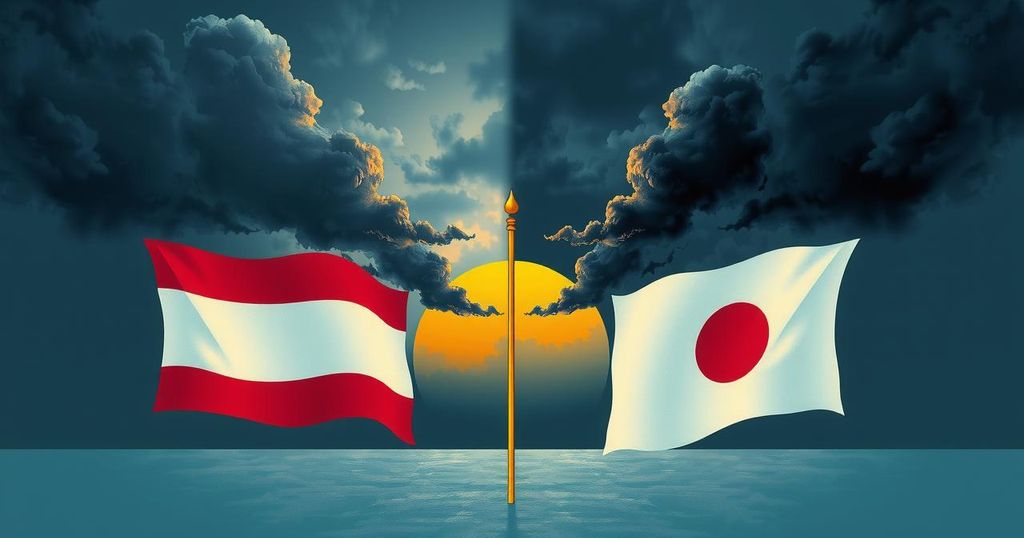Global news
AFRICA, BELGIUM, CONGO, DEMOCRATIC REPUBLIC OF CONGO, DRC, DW, EASTERN CONGO, EU, EU COUNCIL, EUROPE, EUROPEAN UNION, INTERNATIONAL RELATIONS, KRISTOF TITECA, MAXIM, MAXIME PRÉVOT, MILITARY COUP, NORTH AMERICA, REGIONAL COOPERATION, RWANDA, TI, TITECA, UNITED NATIONS, UNITED STATES, WEST AFRICA
Jamal Walker
0 Comments
Diplomatic Break: Rwanda and Belgium Amid EU Sanctions
Rwanda severed diplomatic ties with Belgium following EU sanctions on Rwandan officials over their actions in the DRC. Belgium, a vocal advocate for the sanctions, aims to mitigate Rwanda’s involvement in Eastern Congo conflicts. The situation has escalated into a humanitarian crisis, displacing millions. The effectiveness of the sanctions remains uncertain.
Diplomatic tensions between Rwanda and Belgium escalated significantly when the European Union (EU) imposed sanctions on Rwandan military and government officials due to their involvement in the ongoing conflict in the Democratic Republic of Congo (DRC). The EU’s claims assert that Rwanda has contributed to the instability by deploying troops in Eastern Congo and exploiting its mineral resources. In response to the sanctions, Rwanda severed diplomatic relations with Belgium and ordered the immediate departure of Belgian diplomats.
The sanctions were a result of extensive discussions among EU member states, with Belgium playing a pivotal role in advocating for their implementation. As noted by Kristof Titeca, a professor at the University of Antwerp, “Belgium was clearly the lead in this” initiative. Belgium’s Foreign Minister, Maxime Prévot, clarified that their intention was not to weaken Rwanda but to highlight the complexities associated with its actions in Eastern Congo.
Critics of Belgium’s involvement suggest that historical colonial ties may influence its stance towards Rwanda, given Belgium’s imperial past in the DRC. However, Titeca argues that while colonial guilt may play a role, it does not fully explain Belgium’s actions, particularly considering Rwanda’s own colonial history under Belgium. Instead, he emphasizes that Rwanda’s current actions are inconsistent with international law.
Rwanda faces accusations from international entities, including the United Nations and the United States, of supporting the M23 rebel group, which has intensified fighting in Eastern DRC. This conflict has developed into a severe humanitarian crisis, with over 7 million individuals displaced and estimates indicating that approximately 4,000 Rwandan troops are aiding the rebels. The situation has led to significant loss of life and further displacement since the beginning of the year.
The efficacy of the EU sanctions remains uncertain, despite their intention to pressure Rwanda, a country often viewed as a development success story with substantial reliance on foreign aid. Titeca expresses skepticism regarding the sanctions’ potential to halt the flourishing conflict, citing that they target specific officials and do not address broader EU policies or aid agreements.
The EU has faced internal divisions regarding its approach toward Rwanda, with some members advocating for stronger relations due to Rwanda’s perceived success. Although the EU has previously signed cooperation agreements with Rwanda, Titeca believes additional measures, such as reducing foreign aid, may not be forthcoming. Nevertheless, he views Rwanda’s decisive diplomatic reaction as indicative of the sanctions’ impact.
The recent diplomatic rift between Rwanda and Belgium, triggered by EU sanctions against Rwandan officials, highlights deep-seated regional tensions and the complex interplay of historical relationships. While Belgium’s role as the leading proponent of sanctions raises questions about the influence of colonial legacies, the ongoing humanitarian crisis and allegations of Rwandan support for armed groups underscore the dire situation in Eastern Congo. The effectiveness of these sanctions in altering Rwanda’s actions remains in question, amidst broader discussions on EU-Rwanda relations.
Original Source: www.dw.com




Post Comment